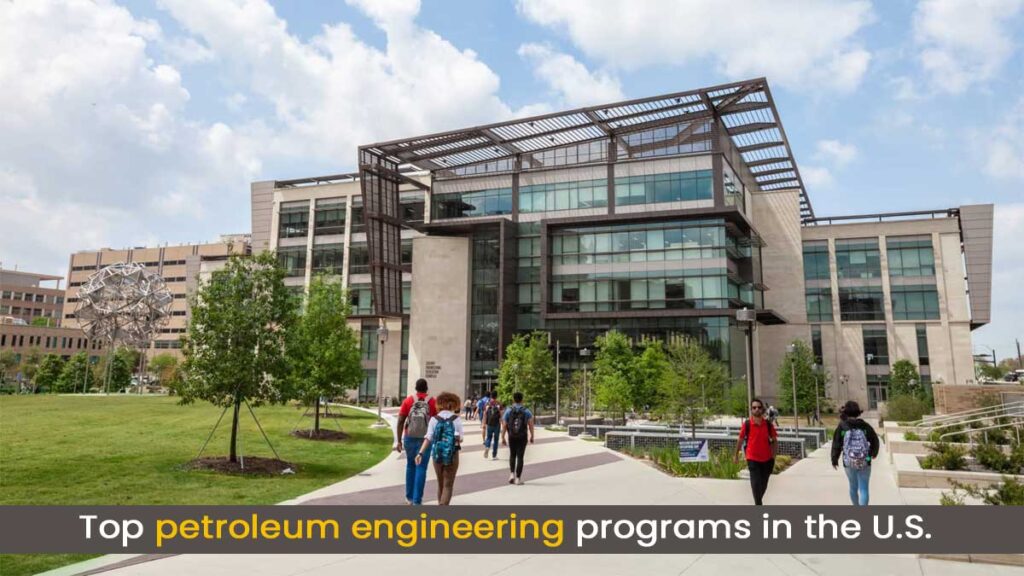Did you know there are 72 petroleum engineering colleges in the U.S.? They have ratings from 2.0 to 5.0 out of 5.0. This variety of schools gives students many choices for their education. As the energy field grows, the need for skilled petroleum engineers increases, making the right program key for success.
In this guide, we’ll look at the top petroleum engineering schools for 2025. These top universities have been picked for their academic quality, industry fame, and student success. If you’re thinking about a petroleum engineering degree or want to grow in your career, this guide will help you find the best colleges.
These programs offer amazing facilities and research chances. With different application deadlines and tough admissions, knowing the best options is vital. Let’s explore the top petroleum engineering education and see which programs are leading the energy industry’s future.
Key Takeaways
- 72 petroleum engineering colleges are listed in the United States
- Program ratings range from 2.0 to 5.0 out of 5.0
- Application deadlines vary, with some as early as March 15 for fall assistantships
- Top programs offer state-of-the-art facilities and research opportunities
- Graduates often receive job offers with above-average salaries
- Program fees range from ₹2.20 Lakhs to ₹12.44 Lakhs for B.Tech degrees
- Some institutions report 100% placement rates for graduates
What Are the Best Petroleum Engineering Schools in 2025?
Choosing the right petroleum engineering program is key for future professionals. The top schools offer great education, industry ties, and research chances. We’ll look at what makes a program stand out.
Evaluation Criteria and Ranking Methodology
Top colleges for petroleum engineering are judged on many things. These include the quality of their courses, the skills of their teachers, and their research and industry connections. Schools that mix learning with practical skills often rank higher.
| Ranking Factor | Importance |
|---|---|
| Curriculum Quality | High |
| Faculty Expertise | High |
| Research Opportunities | Medium |
| Industry Partnerships | High |
| Hands-on Learning | High |
Industry Recognition and Accreditation Standards
Accreditation is key in showing a program’s quality. The Accreditation Board for Engineering and Technology (ABET) has strict rules. Schools that meet these standards are seen as top-notch by the industry.
Employment Outcomes and Success Rates
The best schools have high job rates and good starting pay. For example, some top programs have over 90% of graduates working within six months. They earn more than $70,000 on average. These stats help a program’s reputation and attract students looking for the best in 2025.
Top-Rated Petroleum Engineering Programs Nationwide

The 2025 rankings highlight top petroleum engineering programs in the U.S. These schools offer advanced research, modern facilities, and strong ties with the industry.
Leading Research Institutions
Texas A&M University at College Station is a leader in petroleum engineering. It graduates 175 students each year, who earn $25,562 more than average. The University of Texas at Austin is close behind, with 117 graduates earning $16,197 more.
State-of-the-Art Facilities and Labs
Colorado School of Mines has impressive facilities, boosting graduates’ earnings by $6,836. The University of Oklahoma Norman Campus and Texas Tech University also have excellent labs. These help their graduates succeed in the field.
Industry Partnerships and Collaborations
Many top colleges for 2025 have strong ties with the industry. The University of Houston and West Virginia University are examples. They produce 50 and 71 graduates each year, respectively. These partnerships lead to better job opportunities and higher salaries for graduates.
| University | Annual Graduates | Early Career Earnings Boost |
|---|---|---|
| Texas A&M University | 175 | $25,562 |
| University of Texas at Austin | 117 | $16,197 |
| Colorado School of Mines | 110 | $6,836 |
| University of Oklahoma | 76 | N/A |
| Texas Tech University | 54 | $9,896 |
Career Prospects and Industry Connections

Graduates from top petroleum engineering universities have great career prospects. The world’s need for energy is growing, making skilled petroleum engineers very valuable. They work in areas like exploration, production, and pipeline management.
Top colleges in petroleum engineering build strong connections with the industry. For example, the University of Texas at Austin works with ExxonMobil. Texas A&M University partners with Chevron. These partnerships offer great research and learning chances.
The job market for those with a petroleum engineering degree is strong. Colorado School of Mines, ranked 2nd, has a 100% job placement rate. Graduates can become reservoir engineers, drilling engineers, or data analytics engineers.
Industry events are key for career growth. The Gas Machinery Conference provides training and networking. Many schools encourage students to attend events like ACTE.
| University | Industry Partner | Collaboration Focus |
|---|---|---|
| University of Texas at Austin | ExxonMobil | Research and practical learning |
| Texas A&M University | Chevron | Research opportunities |
| Colorado School of Mines | Schlumberger | Practical training |
| University of Oklahoma | Devon Energy | Research and internships |
| Pennsylvania State University | Shell | Extensive research |
The future is bright for petroleum engineering graduates. With a growing population, the need for energy will rise. This means more jobs in the energy sector for these graduates.
Specialized Training and Technical Expertise
The top petroleum engineering schools in 2025 offer advanced training and technical skills. They prepare students for the oil and gas industry’s challenges. This is done through hands-on experience, the latest technologies, and field training.
Hands-on Laboratory Experience
Leading petroleum engineering programs have modern labs for practical learning. For example, the PNG program at Tunkhannock Center has the latest equipment. This is supported by exploration and production companies. This hands-on learning is key in ranking these programs.
Advanced Simulation Technologies
The best colleges for petroleum engineering use advanced simulation technologies. These tools help students solve complex problems. This is important because 100% of courses focus on critical thinking and problem-solving.
Field Training Opportunities
Real-world experience is a big part of top petroleum engineering schools. Programs often include:
- Internships with industry partners
- Field trips to active drilling sites
- Collaborative projects with oil and gas companies
These experiences make graduates stand out in the job market. Over 90% of petroleum engineering graduates from top programs get jobs. The field is expected to grow by 2% from 2022 to 2032.
When looking for the best petroleum engineering schools in 2025, find programs that mix theory with practice. This ensures graduates are ready for the petroleum industry’s dynamic challenges.
Program Features and Academic Requirements
Top petroleum engineering universities offer a wide range of programs. These programs are designed to meet the needs of the industry. They combine theory and practical skills, preparing students for careers in oil and gas.
Many top colleges for 2025 offer different tracks at the associate level. For example, some schools have AS degrees in Petroleum & Natural Gas Business Administration and Technology. There are also certificate programs for specialized training.
The ratings of petroleum engineering schools consider many factors. These include graduate outcomes and partnerships with the industry. Here’s a quick look at some key program features:
| Feature | Data |
|---|---|
| Graduate Placement Rate | 90% |
| Student-Faculty Ratio | Less than 5-to-1 |
| Annual Research Funding | $5 million |
| Median Annual Salary (Experienced Engineers) | $172,000 |
| ABET-Accredited Undergraduate Programs | 17 |
To get into petroleum engineering programs, you need a strong math and science background. For graduate school, you need a bachelor’s degree and good GRE scores. International students must show they can speak English well.
To become a licensed petroleum engineer, you need a lot of study and work experience. You must study for four years, then work for four years before applying for a license. You’ll need to pass two exams to get your license.
Conclusion
Choosing the right petroleum engineering program is key for those entering this field. The top 15 schools for 2025 offer great education opportunities. They have top facilities, industry connections, and special training for a successful career.
The University of Texas at Austin is the number one school for petroleum engineering, says U.S. News & World Report. Schools like Montanuniversitat Leoben in Austria and the Norwegian University of Science and Technology (NTNU) also stand out. They have low student-to-faculty ratios and diverse programs, helping students succeed.
When looking at petroleum engineering colleges, think about industry recognition, research chances, and job prospects. With a 12.1% job growth from 2016 to 2026, graduates have a bright future. They start with an average salary of $56,374, with more earning as they gain experience.
Exploring these top petroleum engineering schools, remember the best fit is personal. Whether you’re getting a bachelor’s or advanced degree, these schools provide a strong start. By picking one of these top programs, you’re setting yourself up for a fulfilling career in this vital industry.


